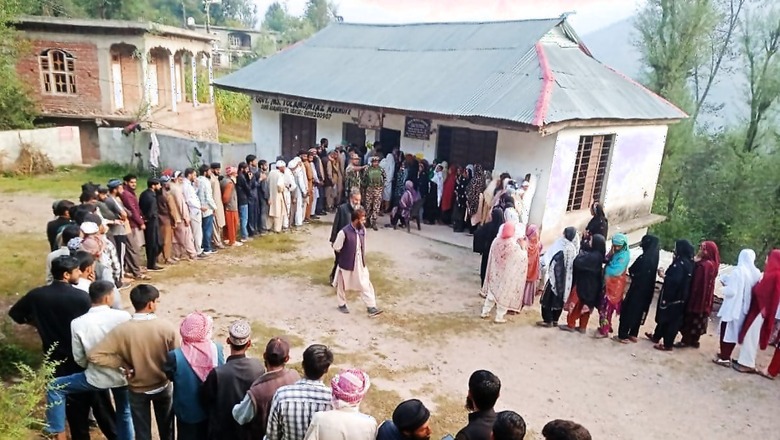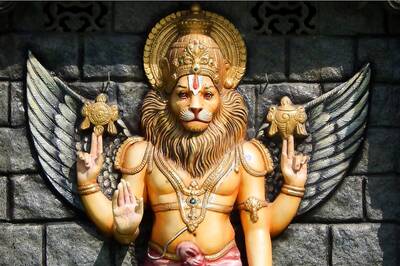
views
The voting percentage may have dipped in the Valley in phase 2, especially in capital Srinagar where it did not touch even 30 per cent, but across the Pir Panjal range, the voting figure stood at 74 per cent for Poonch, 71 per cent for Rajouri and a record-breaking 80.7 per cent in newly carved-out Reasi. These numbers could see an upward revision as the final data is still being collated.
Shadow of terror
While the Election Commission is already calling the voter turnout historic, for the security grid, the bigger achievement is keeping terror at bay.
Rajouri’s Dhangri village is where the current cycle of violence began in 2023 when, on January 1, seven people were gunned down by terrorists. Two others died in an IED blast. Over-Ground Workers, who allegedly helped the terrorists, were arrested from Poonch’s Ghursai village. In April that year, an army vehicle was attacked in Bimbhar Gali, Poonch. A month later, Reasi saw a pilgrim bus get attacked on June 9 as the new government was being sworn-in at Rashtrapati Bhavan. Doda-Kishtwar, which also turned up to vote in huge numbers in Phase 1, saw an encounter just four days before polls.
Villagers in Doda’s Dessa said nightmares of 2018 came back to haunt them as four army men were martyred in an operation in the hills just overlooking the village. In 2018, nine civilians, including village defence guards, were killed by terrorists in the same village. The cycle of violence in Pulwama, Anantnag, and Tral is well documented, though the last five years have seen relative peace.
Given the background, the greatest concern of the security grid was to ensure that voting happened outside the shadow of the gun. For politicians, the challenge was to ensure that fear of bullet did not win over ballot. Terror was the biggest talking point in Rajouri, Poonch, Doda, and Kishtwar.
In Nowshera’s border village of Kala, bunkers are a way of life. Pakistan-occupied Kashmir is just 500 meters from the village, with the local Sarpanch telling News18 that “if you run on this hill, you will reach PoK in 10 minutes”. A Junior Commanding Officer (JCO) was shot by Pakistan just 24 hours before this conversation.
However, the residents did not show any hesitation about voting. “Vote toh hum denge. Hamein insaaf nahi mil raha hai…. uski guhaar lagate rahenge, par vote denge [We will definitely vote. We are not getting justice and will keep asking for it but we will definitely vote],” Gopal Das, a Dhangri massacre survivor, told News18. The terrorists responsible for the Dhangri attack remain unidentified in the National Investigation Agency (NIA) charge sheet and victims feel the local support to them has also not been investigated properly.
Aspirational Voters
The enthusiasm across large parts of the erstwhile state is being attributed to the last 10 years of “bureaucratic autocracy”. Not having a local representative for the past 10 years meant the real issues of people were not raised. “Even for things as basic as police verification for passport or a government job, the silliest of pretext was given and verification denied. We had no one to hold accountable,” an advocate in Doda lamented.
In Bijbehera, an early voter raised the issue of unemployment. “We have really suffered in the last 10 years. There is so much unemployment. There is no avenue to raise our concerns with anyone and hence, I have come to vote,” he said.
In conversations across the UT, unemployment, peace, communal harmony, and drug menace were the running themes.
370, statehood, Jamaat
From these issues stemmed the larger questions of the abrogation of Article 370 and restoration of statehood. For many in the Valley, Article 370 is not history yet. The National Conference has promised to keep the issue alive. In the Jammu division, the abrogation of special status was welcomed by most but concerns about domicile and protection for locals in employment opportunities remained. The return to statehood is a hope that all J&K voters are looking forward to.
Both the Valley and the Jammu division are also closely watching the Jamaat and Engineer Rashid. The Kashmiri Pandits in Nagrota’s Jagti Camp can’t forget the role the Jamaat played in their exodus but many feel that Jamaat returning to the democratic process will be good for Pandits who want to come back home.
The security establishment too has welcomed the participation of Jamaat-backed Independents. “This is heartening news that sections of Kashmiri society that indulged in stone-pelting, boycott call, and separatism are now part of the democratic process,” an official told CNN-News18. Parties like National Conference see these actors as “B-Team” of BJP, with Omar Abdullah’s shock defeat at the hands of Engineer Rashid in Lok Sabha elections still a talking point.
However, increasingly, voters seem to be assessing candidates on the “delivery parameter” rather than their party affiliations. Ghulam Nabi Azad, whose DPAP is a fringe player in these polls, summed it up when he told CNN-News18: “Young voters who do not carry any baggage from the past are the most enthusiastic in these polls. They don’t know who did what before 2014. They want delivery and are judging each candidate on what he or she can bring to the table.”

















Comments
0 comment